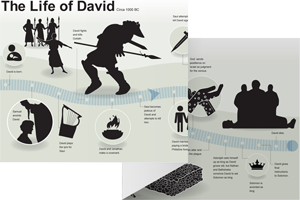7:1–17 This chapter records the Davidic covenant, where Yahweh promises to give David an enduring dynasty, throne, and kingdom (see 2 Sam 7:16). Yahweh makes 10 promises concerning David, his offspring, and Israel—each one demarcated in the Hebrew text by an “I will” statement. Ethan the Ezrahite, a Jewish sage who lived in the time of Solomon, celebrates this covenant in Psa 89 (compare 1 Kgs 4:31). |
7:1 had given rest to him David’s kingdom was solidified and there were no significant or imminent threats.
7:2 Nathan A court prophet during the reign of David.
Nathan is introduced in 2 Sam 7:2 as a prophet who is instrumental in David’s reign. God uses him to confront the king, uphold righteousness, and to make His word known. Nathan is portrayed as a faithful prophet and does not take part in attempts to usurp Davidic or Solomonic rule. He surfaces in three primary accounts: the Davidic covenant (ch. 7); the rebuke of David for his sin with Bathsheba (ch. 12); and Solomon’s coronation (1 Kgs 1). In each instance he proves faithful to Yahweh’s standards and will. |
in the middle of the tent David, who is Yahweh’s servant, dwells in a royal palace while Yahweh Himself (whose presence was focused on earth via the ark of the covenant) dwells in a tent. David seeks to more properly accommodate Yahweh.
7:3 Go and do all that is in your heart Nathan initially agrees that something must be done. Yahweh will later give clarification to the prophet on the matter (see 2 Sam 7:4–17).
7:5 you the one to build for me a house Yahweh begins to realign David’s presuppositions about what it means to be a king under His reign.
7:6 in a tent Although Shiloh was a centralized place of worship during the period of the judges and the place of worship there had been called a temple (1 Sam 1:9) or house of Yahweh (1 Sam 3:15), it was not a permanent residence (e.g., Josh 18:1; 1 Sam 2:22; Psa 78:60). It also seems that Shiloh had previously been ransacked, leaving the place to meet Yahweh as a tent in Jerusalem (2 Sam 6:17).
7:7 I speak a word Signifies a rhetorical question, anticipating a negative answer.
I commanded to shepherd my people Israel Compare note on 1 Sam 9:3.
7:8 I took you from the pasture See 1 Sam 16:11; 17:15, 20, 34.
7:9–15 The Hebrew text of this section contains 10 “I will” statements by Yahweh (2 Sam 7:10, 11, 12, 14, 15). Each one highlights a promise Yahweh makes to David, his offspring, or Israel. The promise in v. 13 is a reiteration of the second promise in v. 12. |
 Covenants in the Old Testament Table
Covenants in the Old Testament Table
7:9 I will make a great name for you Yahweh first promises to make David’s immediate reputation and his enduring legacy great.
7:10 a place The Hebrew word used here, maqom, could refer to the temple—the house that David wants to build for Yahweh. Alternatively, it may refer to the land over which David is now reigning, thus reflecting an earlier promise Yahweh made to Abraham (see Gen 15:7; 17:8).
I will plant them Yahweh’s third promise is related to the second; not only will He designate a place for His people, He will also ensure that they are firmly established there.
7:11 I will give you rest Yahweh promises David security and peace (compare 2 Sam 7:1 and note).
will build a house for you David desires to build Yahweh a house, but Yahweh tells David instead that David’s house (his dynasty) shall be established. This blessing had already begun in 3:2–5 and 5:13–16.
7:12 I will raise up your offspring Yahweh’s sixth promise refers to Solomon, as evidenced by the following promise, which refers to the descendant’s kingdom (see 1 Kgs 1:29–30). In addition, 2 Sam 7:13 states that this person will build a house for Yahweh’s name, a feat Solomon accomplishes in 1 Kgs 5–6.
I will establish his kingdom Yahweh guarantees that David’s son (Solomon) will rule in his place.
7:13 will build a house for my name Refers to the temple (see 1 Kgs 5–6). According to 1 Kgs 5:3, David could not build the temple until he had achieved rest from his enemies; 1 Kgs 5:3 and 2 Sam 7:11 suggest that the rest David was already experiencing, mentioned in v. 1, was temporary.
I will establish the throne of A reiteration of Yahweh’s seventh promise (see v. 12 and note). Here, Yahweh adds that the Davidic throne will endure into perpetuity. Compare note on v. 16.
7:14 a father Yahweh promises to adopt David’s offspring; this reflects the common ancient Near Eastern custom of the king being adopted by his god.
7:15 loyal love shall not depart Yahweh’s tenth and final promise is comforting—He promises that His love for David’s offspring will endure (compare Psa 89:33–35).
7:16 The three promises in this verse—the permanence of David’s dynasty, kingdom, and throne—summarize Yahweh’s 10 promises in 2 Sam 7:9–15. They are mentioned three times in Psa 89:4, 29, 36. |
7:17 all this vision See 2 Sam 7:4–5.
7:18–29 David expresses a sense of awe at Yahweh’s gracious promises and conveys his deepest gratitude. Compare 1 Chr 17:16–27. |

|
About Faithlife Study BibleFaithlife Study Bible (FSB) is your guide to the ancient world of the Old and New Testaments, with study notes and articles that draw from a wide range of academic research. FSB helps you learn how to think about interpretation methods and issues so that you can gain a deeper understanding of the text. |
| Copyright |
Copyright 2012 Logos Bible Software. |
| Support Info | fsb |
 Loading…
Loading…


 Nathan
Nathan